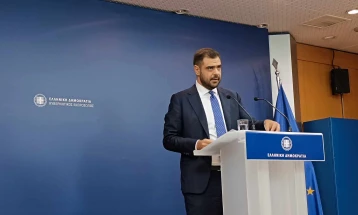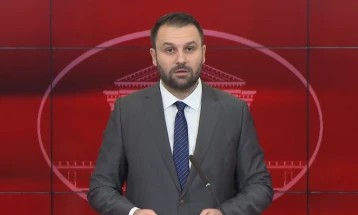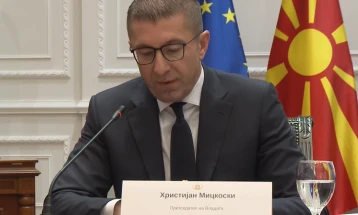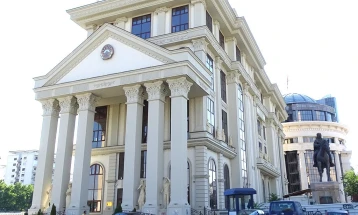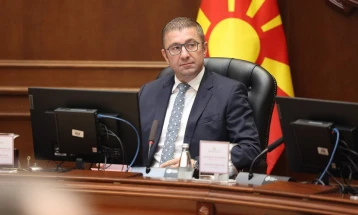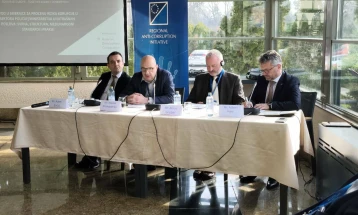Not goodneighborliness if someone tells us who we are and what language we speak, Dimitrov tells PACE
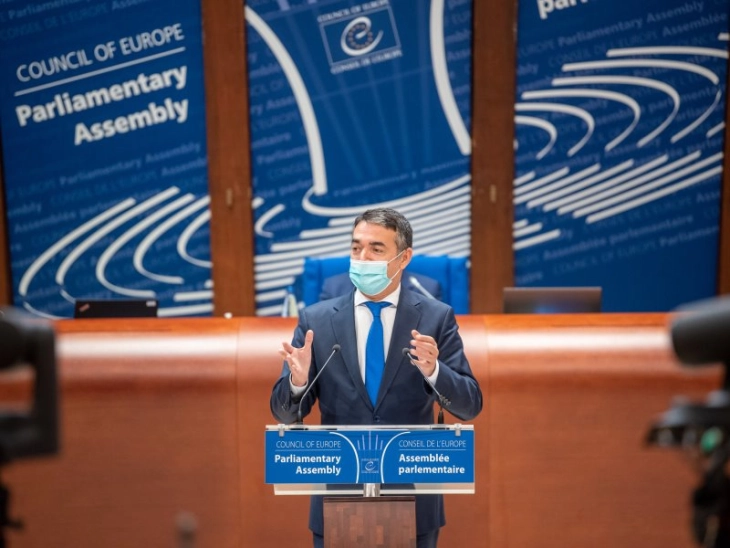
Strasbourg, 30 September 2021 (MIA) – No country can say or dictate who we are and what language we speak, because it is not goodneighborliness if you do this to your neighbor, said Deputy PM for European Affairs Nikola Dimitrov in his address at the Autumn Session of the Parliamentary Assembly of the Council of Europe (PACE) on Thursday, MIA reports from Strasbourg.
In the remarks, Deputy PM Dimitrov referred to North Macedonia’s European integration, the sacrifices it has made and the disappointment from the two vetoes by Bulgaria. He said the “dispute” with Sofia is not territorial but related to different interpretation of history, recalling on the symbolism of the European values that promote diversity, respect for one’s identity and language.
“No country can say or dictate who we are and what language we speak, because it is not goodneighborliness if you do this to your neighbor. Any solution should take into consideration the European spirit. These actions have derailed the process and we are not to blame for this,” noted Dimitrov.
He said the claim by Bulgarian MP and former foreign minister Ekaterina Zaharieva that “those who wish to declare themselves as Bulgarians are discriminated in North Macedonia, along with the hate speech in the country” is baseless.
“There has not been a single complaint on discrimination before the European Court of Human Rights. I am not aware which accusations are those circulating in the Bulgarian public and by Bulgarian politicians. North Macedonia is a multiethnic country, our Constitution and political tradition are guided by the principle that we are all equal and live in the same home. This policy is not shared by all countries in the region,” said Dimitrov and added that everyone is free to state his/her national or ethnic affiliation at the ongoing Census.
On hate speech, he said none of the Government officials has used it, unlike representatives of political parties in Bulgaria, whose statements during election campaigns “can be interpreted as direct aspirations towards North Macedonia and as hate speech.”
“What you describe as rising anger and hate speech is caused by you telling others who they are, what language they speak and their history. Displeasure is understandable in such circumstances and we condemn these incidents,” said Dimitrov.
He added that Bulgaria’s policy towards North Macedonia fails to foster friendship but antagonism, while telling Zaharieva “you are feeding this” and providing support to the initiative of the Council of Europe to set up an Observatory on History Teaching in Europe.
The Deputy PM highlighted that the country has no alternative to Europe.
“If Europe fails to deliver on its promises, it will lose the trust of the people living in this part of the continent. The deserved breakthrough on the Euro-integration path is crucial in the strengthening of EU’s relations with the region, strongly reflecting the Union’s geostrategic role,” underlined Dimitrov.
During his visit to Strasbourg, Dimitrov met with Council of Europe Secretary-General Marija Pencinovic-Buric, PACE President Rik Daems and several Assembly members, including French MPs Jacques Maire and Liliane Tanguy of President Emmanuel Macron’s party La Republique En Marche, and Greek MP George Papandreou, current president of the Socialist International and former Prime Minister of Greece.
